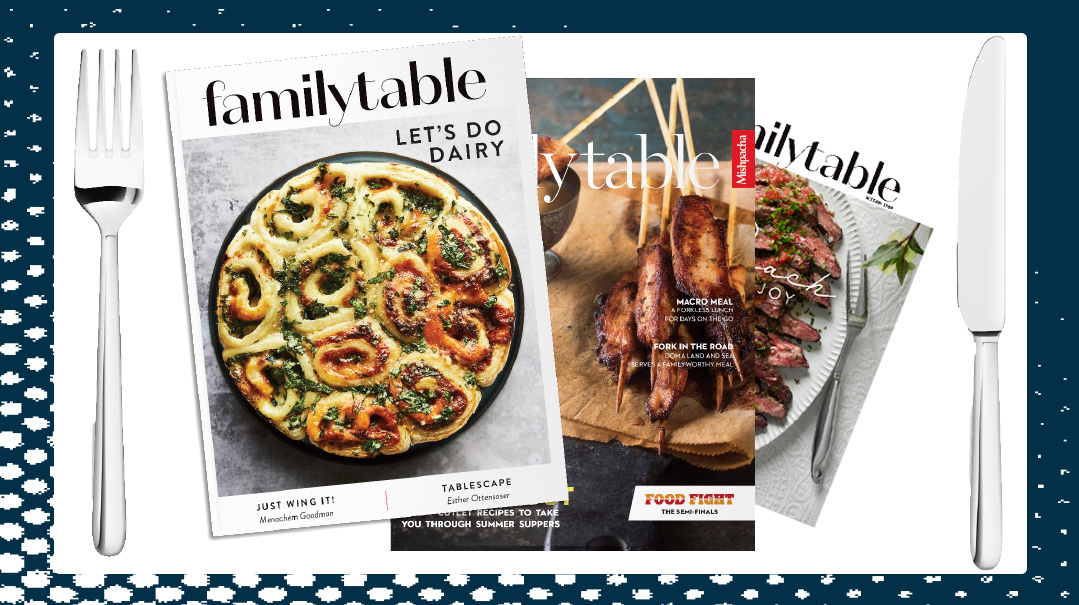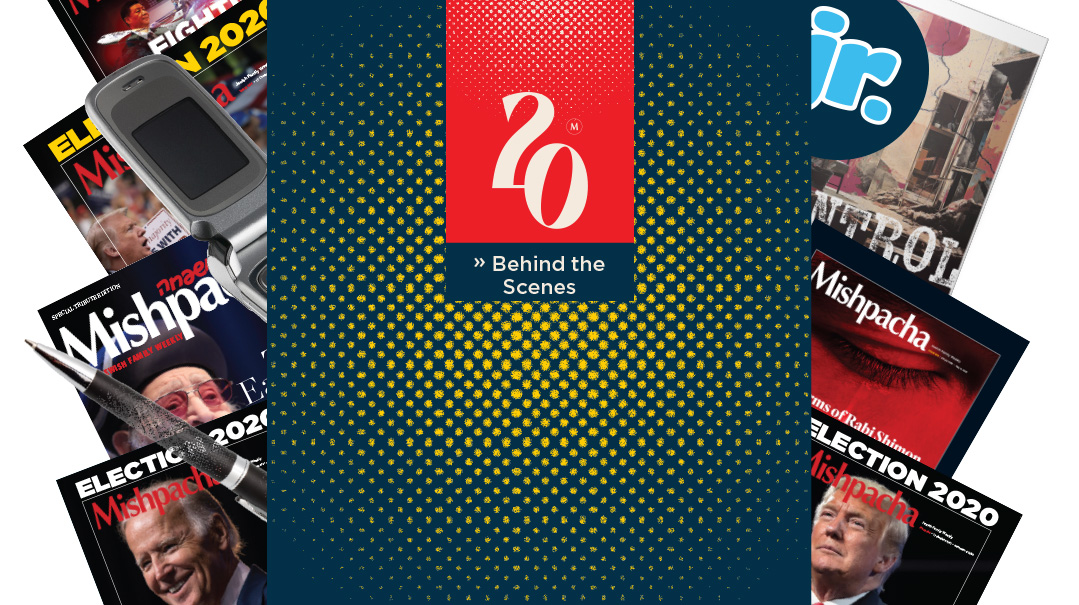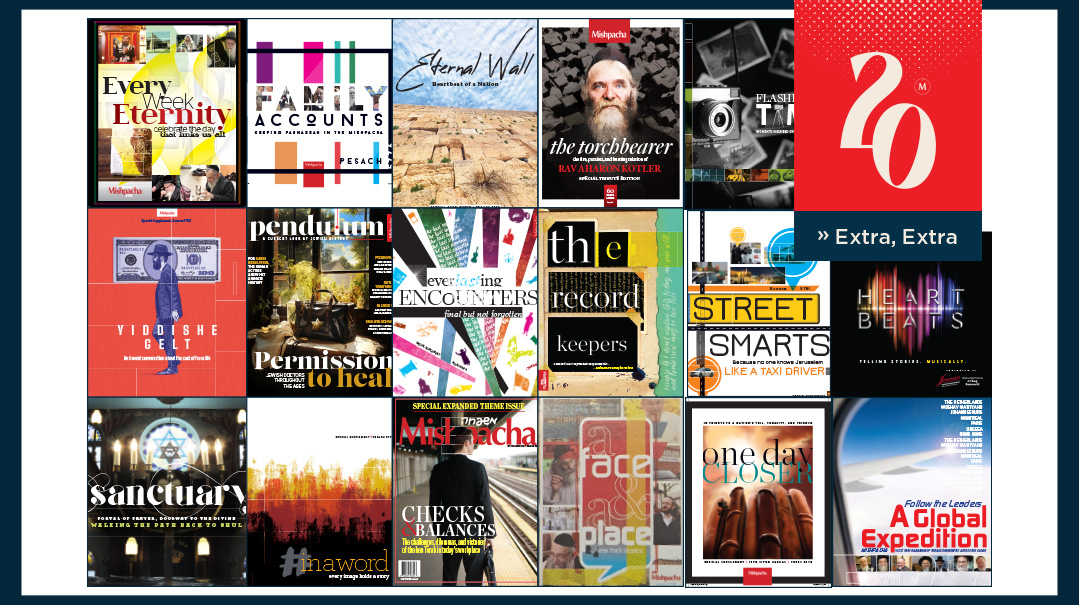Hustle and Heart
| April 16, 2024We spoke to some of the visionaries who’ve led the advances in frum marketing during the past two decades

As the frum magazine industry developed and expanded to the force it is today, the advertisements hosted on its pages came of age as well. Open Mishpacha today and you’ll find a showcase of marketing material saturated in creativity, intelligence, and sheer heart. Who are the brains behind these advertising campaigns forging public opinion, branding new goods and services, and raising hundreds of millions of dollars for tzedakah? We spoke to some of the visionaries who’ve led the advances in frum marketing during the past two decades to find out.
Our Panelists

Ad by Ad
Year by Year
2004
All About Design
Since the 1990s there have been amazing frum agencies doing excellent work. Back then, the focus was on design, and ads were designed by graphic designers.
—Yitzchok
2005
Beyond Design
As we worked on the “Bloomberg for Mayor" campaign, we realized we were much more of a marketing firm than a design firm — so we switched our name from Bottom Line Design to Bottom Line Marketing Group.
—Yitzchak
2006
Text Heavy
The ad styles were “ungepatchked” and text heavy. It was all design, no concept. Text was homemade, written by someone who knew how to put together the words. And the more words you got in, the better.
—Shlome
2009
Market Approach
This is the year that marketing agencies emerged, offering a full spectrum of services. The design was only a small piece of it.
—Chayale
2010
Clean and Strong
This is the year that less became more. Ads became clean and beautiful with a strong brand identity through iconic colors and fonts. And we began thinking beyond design. We touched on strategy — focusing on one element that delivered a punch.
—Yossi
Can You Feel It?
This was the point when smart advertising campaigns began influencing our attitudes and decisions. A good campaign could make us want things we never before dreamed of. Ads made us feel. With the Rich Chocolate campaign, Pivot Group made us feel a certain way about a chocolate bar.
Strategic marketing also helped us convey the essence of an organization. The possibilities were endless because people were able to feel for an organization like never before.
—Chayale
2013
A Culture is Born
People began respecting the value of the marketing industry and admiring talent. Marketing guys were cool artists who had fun with your brain. At GCNY, we created a Manhattan vibe in a Brooklyn agency. We intentionally added a culture of excitement and electricity. Who wouldn’t want to take a helicopter ride with their coworkers? People wanted to be part of a gutsy, hip place. And that attracted cool talent.
—Yossi
2014
Less is Bold
Minimalism and simplicity caught on. The more you talk, the smaller you are. Less is bold.
We no longer jumped directly to design. Instead, we started strategizing from the bottom up with intense research and discovery. Strategic writing came into play with brilliant copy that let us get into the reader’s brain. We worked on positioning companies with a certain feel: sunny, fresh, and delicious, or luxurious, minimalistic, and sophisticated.
Once we nailed the strategy, we then got to work creating a visual design system to recognize and “feel” a company — even without the name or logo. That was a huge accomplishment.
—Yossi
2015
Tight is Right
We noticed that our readers’ attention span was shrinking, so we tightened our messaging. We had to catch them during that first glance — or it was on to the next page. Of course, that comes with a risk, so the simpler the ad, the more confidence you need.
—Shlome
2016
In an Instant
The world was changing and there was a need for instant reaction. With print there’s always a delay. Imagine if we could put something online and get an instant reaction? It took a nuanced understanding to maximize the results. How could we best connect so people would react? We needed the right headlines with the right pictures.
—Chayale
Model Citizens
This was the year that the first frum models were introduced into our campaigns. We’d show a heimishe guy with a beautiful silver becher and that was the gimmick. That’s it. An authentic frum Yid making Kiddush was enough to grab readers. Once this trend got abused, it was on to bigger and better. The photography then needed a creative twist.
—Shlome
2018
Buy Smart
The conversation began in 2015, but by 2018 the value of a professional doing your media buying was strongly defined. The explosion of so many publications — both in print and online — created a lot of unknowns: Where was the best place to spend the marketing dollars, and how much money should you spend? What was your target audience reading and engaging in? Media buying built a strategic budget and strategy, removing the guesswork.
—Chayale
2019
Peak of Growth
At the cusp of 2020, the frum American media became very polished and sophisticated, surpassing other parallel markets. The bar was raised. It became more and more difficult to stand out with your brilliance. The copy also shifted. Quirky copy took off. It took a second to “get” it, but when you did, you felt amused and gratified.
—Yossi
2020
The Next Dimension
The 3-D Agudah logo in the iconic Agudah campaign by Mutty Landau from Heart.Works was gorgeous. It made me say to myself, I need to bring in 3-D!
—Shlome
2020
Positive Messaging
During Covid, the Chofetz Chaim Heritage Foundation wanted to do something that would have a real impact, not just raise money. At that time people needed chizuk. We set a goal of getting 10,000 people to make a unique shmiras halashon commitment. It happened within a week and everyone was amazed. Other such campaigns (such as “Put it Away”) followed.
—Chayale
Explosion of Online
When we couldn’t be around people, tech became our main medium of communication. Face-to-face was replaced by screen-to-screen, and online marketing exploded. The results were off the charts!
—Chayale
2021
Clip and Save
This is the year that video clips became very popular in our market. Fifty percent of the ads we created were animated for online platforms and WhatsApp.
—Shlome
2022
Eye on AI
As AI began crossing from the world of sci-fi to a business tool, we designated one employee to monitor where AI was going. We realized that AI wasn’t replacing anyone, but it did speed up the process; our imaginations become limitless.
The other thing it did was force us to up our game even more. With AI it’s become so easy to produce, so our creative output had to stand way above anything AI could generate. With each new AI program, we need a compelling reason why someone needs me over AI.
—Shlome
The Lifestyle Look
Instead of those perfectly posed shots, the new trend was lifestyle photography — catching subjects absorbed in action. Of course, it takes a team of stylists and professionals to get the perfect “candid” look and feel. By 2023, some photoshoots took us across the world, to places like Israel or Italy.
—Shlome
2024
Print Is Real
Twenty years into this adventure, we’ve learned that as much as the online world has exploded, print still holds its significant place in media. Digital ads move quickly. You can’t control what and how much is being thrown at you. A print ad, in contrast, is real. You can touch it. You can look at print ads at your own pace and by your own choice. That’s why print ads often serve as defining moments of a campaign.
—Chayale
2025
Looking Ahead
What’s next? Deep, smart, creatively executed illustrations will become a thing. Optimized customer journeys for online Google searches will become more of a thing in the frum world, and certain online platforms will take off even more.
—Yossi
Perks of the Job
There’s a lot of pressure in this fast-line vocation, but the perks are correspondingly impressive. What were some high moments on the job?
We get to be a part of campaigns that raise millions of dollars for tzedakah. How cool is that? The impact of our work moves companies and helps others shine and earn parnassah.
—Yossi
There’s a thrill watching your work produce results. During our recent Rich Chocolate campaign, we actually had to pull the ads after a couple of weeks because there was no chocolate left.
—Shlome
The right messaging creates a boost of confidence and purpose. For example, the recent Flatbush Hatzoloh campaign turned the Hatzoloh guys into the most celebrated guys in town; it turned them into heroes. A good campaign can build a stronger drive and purpose. And it’s amazing to be part of that.
—Chayale
In political campaigns, it’s always been standard to have real people, not models, in campaign ads. When we worked on the “Bloomberg for Mayor” campaign in 2005, we needed last-minute pictures of Mike Bloomberg together with children in our community. There was no time to find kids and get photo releases, so we used my children. I had him do math homework with my daughter Miriam. The joke was: Is there anyone better than Mike Bloomberg to teach math? He sure knew a thing or two about money!
—Yitzchok
Now, That’s a Campaign
During the last 20 years, frum media has featured no end of bright, clever, or moving campaigns. Which ones still stand out, and why? The experts share their top picks
Campaign: Pomegranate Supermarket
Year: 2010
Backstory: Who can forget the Pomegranate ads? These ads, designed by KZ creative, were the first ads to really wow me and wow everyone. Eli Kaufman and Zevi Zilberberg deserve credit for raising the bar. The copy and design were clean and clever. Before that, companies would create ads with different looks each time — red, orange, green — why not change it up? With this ad campaign, Pomegranate achieved a consistent and strong brand identity.
—Shlome
Campaign: Imperial Collection
Year: 2010
Backstory: This was my first client. A premium Russian brand of vodka wanted to break into the kosher market.
It was Shavuos time, so I took a photo of two vodka bottles and photoshopped them into a mass gathering of Jews. The text: “Naaseh v’nishteh amru k’echad.”
This ad shook up the world. It was exactly the thing people loved to hate. I got hate mail. Roshei yeshivah spoke out against it.
And I learned a lot about sensitivity and culture. It’s not only about brilliant creativity. We have to be eidel and understand our audience; the ads have to resonate with them. This campaign also showed me the value of marketing; I saw just how much people cared.
—Yossi
Campaign: RCCS There Are No Words
Year: 2014
Backstory: The iconic yellow ads had four words crossed out: “There are no words.”
The message was bold and powerful: Let the pain be pain. That yellow color represented RCCS.
What amazed us was how a female-driven campaign, on a party level, raised such an incredible amount of tzedakah. The campaign was crazy successful, and the women behind it deserved a lot of credit!
—Yossi
Campaign: Keren Hashviis
Year: 2014
Backstory: What the Ptex group did was sheer brilliance. They took a totally foreign concept — farmers and Israeli agriculture — and brought it close to home with artistic close-up photography and text that made it so personal. Not only that, but they turned the farmers into heroes instead of pitiful people who needed our help. This campaign united Klal Yisrael to stand behind the farmers and the mitzvah of shemittah.
—Shlome
Campaign: Dirshu Yid
Year: 2020
Backstory: With Dart Media’s signature “Dirshu Yid” campaign, they created a movement of balabatim striving to become lomdei Torah. The key: creating a title for the learners that brings them well-deserved pride and a sense of being a better Yid.
—Yossi
Campaign: India Needs our Help
Year: 2022
Backstory: This was the strangest thing I ever did!
There was a terrible natural disaster in India, and the OU wanted to launch an emergency campaign to provide oxygen concentrators. The OU felt it was important to show the world that Jews cared for greater humanity.
When they called me, I had a hard time connecting. India? Seriously? This was so foreign to me. But with enough effort you can build connection. I looked at the pictures and read articles. I tried hard to really feel what the people in India were going through.
In the end, that campaign was a success, and it generated a tremendous kiddush Hashem.
—Chayale
The Elements of a Campaign
“Less is more” isn’t just a helpful recommendation.
It’s a must! It’s never a good idea to put two messages into one ad. Sometimes a client will look at an ad and say, “This is what I paid for?” I say no, you paid for everything that I left out of the ad! As Mark Twain said, “I would have written a shorter letter, but I didn’t have time.”
—Shlome
The 80:20 Balance
Every company can use a balance of 80- and 20-year-olds.
We need the vibrancy and passion of the youth — their ideas are amazing and exciting. The youth lights the fire that keeps everyone else on their toes. At Bottom Line Marketing Group we pride ourselves in our employers who weren’t even born when our company was founded!
Yet the veterans in the field bring in solid wisdom. There are certain mistakes that only the veterans can catch.
—Yitzchok
Deadline and Adrenaline
Creatives work well under pressure. Deadlines get us going. That’s when the adrenaline kicks in with an electrifying, creative high. Sometimes the client is waiting in the conference room, and we still haven’t figured it out yet, but he’s waiting, so we’ve got to do this, and punch! The idea comes.
—Yossi
Nuanced Connecting
Jewish women bring a lot to the table: We‘re natural multitaskers, figure-it-outers, and deep connectors.
Every campaign starts with intense research and discovery. That can only happen by connecting to the client at a deep level. Over the years, I’ve developed an obsession with connecting to my clients. I will only talk over Google Meets, not the phone, so I can see the client face-to-face, and I am personally involved in every campaign.
Everything boils down to connection with people. When clients tell me that they‘re a B2B, I say no, you’re a B2C, because the business owner is a person. And you need to connect to him. It’s all person to person, heart to heart.
—Chayale
It Could Only Happen Here
Over the course of their years in the business, these marketing experts have accrued a history of hard-to-believe escapades and near-disasters. Here’s a sampling:
Lost Forever?
The B Campaign for the Boro Park Hatzolah was the most disastrous near-fiasco in the history of GCNY Marketing.
We spent weeks working on the auction booklet. Everything is booked backward, so we were working with a tight deadline.
Three days before going to print, the file was intercepted in InDesign. About 60 pages of photography, writing, and design were gone! We brought in tech experts to revive it, but they couldn’t do anything. Back then, clouds were things in the sky. Our work was gone forever.
It was death!
Our heart and soul goes into our work; our soul is sold to the product. Especially this campaign — it was a community organization. It was Hatzalah!
We spent the next three days working through the days and nights. The owner of The Loft Steakhouse is a Hatzolah member, so he sent us supper each night. We punched through until the end and the product was perfect. The campaign was on fire!
It was a sick campaign, but it took a lot of craziness to get there.
—Yossi
Deadline Drive
Dirshu held one siyum on Monday night and a second in Binyani Ha’Umah on Tuesday night.
We wanted to get extensive coverage into that week’s papers (that come out on Wednesday), but the deadlines were on Monday and Tuesday nights. So we assembled an amazing international team of writers including Rabbi Nachman Seltzer, Rabbi Avraham Birnbaum, Rabbi Menachem Eidelman, and Rabbi Shimon Bloom.
Our team began working in a hotel. But a youth group was playing football in the hallways and we couldn’t think straight — so we transferred to the Crowne Plaza to work through the night until we were ready to send off the material to print.
That Shabbos, I met a friend who had been at the event. “I don’t understand. The event just happened! How did you get so much coverage into this week’s papers?”
That, my friend, is media!
—Yitzchok
The Disappearing Model
When we first started running ads featuring frum Jews, it was almost impossible to find frum models. We tried dressing up secular models with fake beards, makeup, and beketshes; but it wasn’t the same.
Then we finally found a frum guy who was willing to model. We did the shoot, built the ad, and then we had to pull it because his mother-in-law found out and was hysterically mortified!
As the concept took off, more and more men became comfortable serving as models for compensation — either payment or in the form of the item they were modeling (such as a $5,000 shtreimel). And we make sure that each one signs a consent form.
—Shlome
(Originally featured in Mishpacha, Issue 1008)
Oops! We could not locate your form.







